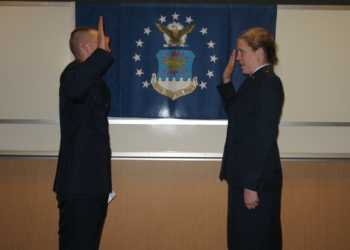Deployments are a test of resilience for military couples. However, with the right strategies deployments don’t have to strain a relationship — they can strengthen it. Successful couples navigate the challenges of distance, emotional strain, and uncertainty by cultivating intentional communication, emotional transparency, and mutual trust. As an executive coach and the spouse of a veteran, I’ve seen firsthand how relationships can not only survive deployment– they can thrive. The key is approaching each deployment with a proactive mindset and a commitment to growth. Here’s how to leverage these principles to maintain and deepen your connection during a deployment.
Create a routine to prioritize meaningful communication
Communication is more than just staying in touch during deployment — it’s about preserving and nurturing your emotional bond. This means being intentional about how and when you connect. Establishing a communication routine through letters, emails, or video calls helps create a predictable touchpoint in an otherwise uncertain time. These scheduled moments offer a sense of normalcy and reinforce the notion that your relationship remains a priority despite the miles between you.
It’s also important to go beyond surface-level updates. Relationships thrive on shared experiences, so don’t hesitate to talk about the small, everyday things — the mundane moments that make up your day-to-day life. Sharing these details allows both partners to stay involved in each other’s lives, fostering a deeper emotional connection. This kind of communication builds a shared narrative, even in the face of physical separation.
From a leadership perspective, this aligns with the concept of relational intelligence — the ability to foster strong, meaningful relationships by being intentional about how we communicate and engage. Honing this skill is invaluable during deployments.
Be emotionally transparent
Deployments bring a range of emotions — loneliness, frustration, anxiety, and sometimes fear. While it might be tempting to bottle up these feelings to avoid burdening your spouse, doing so can create emotional distance. Instead, lean into vulnerability and practice emotional transparency. Share how you’re feeling and encourage your spouse to do the same. This exchange not only builds trust but deepens emotional intimacy.
Emotional transparency requires both partners to practice active listening, a crucial relationship skill. Listening without judgment or jumping to solutions allows your spouse to feel heard and understood, even when their emotions differ from yours. This skill isn’t just beneficial for personal relationships; it’s also transferable to the workplace where leaders are tasked with navigating complex emotions and supporting their teams.
Set clear expectations and be flexible
Before deployment, it’s crucial to set clear expectations about communication, emotional needs, and how you’ll support each other through the challenges ahead. However, military life is unpredictable, and expectations must be paired with flexibility. Calls may be missed, plans may change, and communication might be sporadic. Maintaining flexibility under these circumstances helps prevent frustration and disappointment.
Setting expectations is a leadership tool often used in high-stakes environments. Leaders who set clear, attainable goals but remain agile when circumstances change are better equipped to lead through uncertainty. Similarly, balancing clear communication with adaptability in relationships strengthens the partnership during challenging times.
Foster mutual growth and independence
Deployment is an opportunity for both partners to grow as individuals. Encourage your spouse to develop themselves while away, whether through professional skills, personal development, or self-care and do the same for yourself. Personal growth during deployment enriches you individually and enhances your relationship by bringing fresh perspectives and experiences when you reunite.
This growth mindset reflects the leadership principle of continuous improvement — the idea that challenges should be seen as opportunities for growth and development. Embracing this mindset within your relationship allows both partners to emerge from deployment stronger individually and as a couple.
Build and lean on a support system
No relationship thrives in isolation, especially during deployment. Having a robust support system is essential for maintaining emotional well-being. Surround yourself with friends, family, or fellow military spouses who understand the unique challenges of deployment and can provide emotional support when needed. This support network helps alleviate feelings of isolation and reinforces your resilience.
In the context of leadership, this aligns with the principle of building alliances — surrounding yourself with a network of people who provide support, guidance, and different perspectives. The stronger your support system, the more emotionally equipped you are to handle the rigors of deployment and beyond.
Celebrate milestones and plan for the future
Celebrating milestones during deployment is essential, no matter how small they may seem. Acknowledging birthdays, anniversaries, and achievements — whether through care packages, love letters, or plans — keeps the emotional connection alive. These moments of recognition provide something positive to look forward to, whether a future trip or a post-deployment reunion. Having something to anticipate helps sustain hope and motivation during difficult times.
Planning for the future is also a strategy used in effective leadership. A vision for the road ahead, both in relationships and professional life, creates a sense of purpose and direction. In a deployment context, it reminds both partners that the separation is temporary, but the relationship is enduring.
A proactive approach to strengthening your relationship
Deployments test any relationship’s strength but offer opportunities to grow closer. By prioritizing meaningful communication, practicing emotional transparency, fostering mutual growth, and leaning on a strong support system, you can turn deployment challenges into a foundation for a deeper connection. Just as in leadership, facing adversity with a proactive, growth-oriented mindset allows you to emerge stronger individually and as a couple. Through these strategies, you and your spouse can navigate the complexities of deployment and come out on the other side with an even more resilient bond.









































